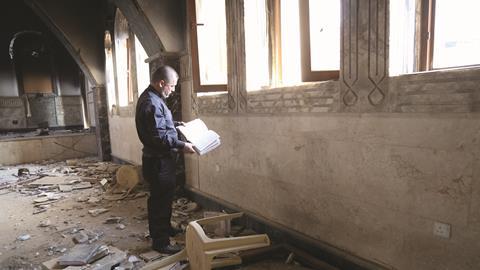Stories of Christians being persecuted around the world rarely make the headlines in the mainstream media. Heather Tomlinson investigates why
Did you hear about the atrocity in the Democratic Republic of Congo (DRC) earlier this year, when 70 Christians, including women, children and the elderly, were slaughtered, many of them beheaded? If you support one of the many Christian anti-persecution charities or read Christian news (including this magazine), you may have. But if you rely solely on mainstream news sources, the chances are you may be unaware.
For many years, there has been a conspicuous absence of stories about the suffering of Christian minorities, especially in the poorest countries of the world, such as Somalia, Niger and Sudan. The persecution charity Open Doors estimates that 4,476 Christians were killed for their faith last year globally – a conservative, minimum estimate. Yet, these terrible events rarely seem to feature in the headlines of our national newspapers or on the TV news.
Following the events in DRC, which first came to public attention through Open Doors in February, the lack of mainstream media coverage itself became the story. The ever-increasing number of Christian voices on YouTube and social media began wondering why there was silence in the mainstream. The US Christian broadcaster CBN News spoke for many when it asked: “Why is the media silent?”
Untold suffering
The average Brit is likely unaware that Christians are the most violated religious group in the world. In 2009, the International Society for Human Rights (ISHR) estimated that Christians were on the receiving end of 80 per cent of the world’s religiously motivated discrimination, making them the most violated religious group in the world. Ten years later, a report into Christian persecution was commissioned by the UK government and undertaken by Rt Rev Philip Mounstephen, then Bishop of Truro. That report concluded that the persecution of the Church is disproportionately sidelined by the media.
“[The] global war on Christians remains the greatest story never told of the early 21st century” said John L Allen in The Spectator. It’s arguably a curious omission. The US branch of Aid to the Church in Need (ACN) concluded in 2017: “At a time in the West when there is increasing media focus on the rights of people regardless of gender, ethnicity or sexuality – to name but a few – it is ironic that there should be such limited coverage of the massive persecution experienced by so many Christians.”
Dr John Newton, who has worked at ACN for 17 years, has experienced this lack of interest directly: “Several months into starting my post…I realised that the media was largely unconcerned by the subject of Christian persecution,” he says. Broadcasters refused an opportunity to interview a bishop in a persecuted Indian diocese. When Newton asked why, they replied: “because Christian persecution isn’t on our news agenda.”
Former BBC director general Sir Mark Thompson admitted on ‘The New Humanum’ podcast: “The record…is spotty.”
Why might such neglect occur? I’ve spoken to mainstream journalists and PR staff at Christian persecution charities in order to find out. Here’s what I’ve discovered.
Counting the cost
The internet changed the media industry forever, reducing its income dramatically. Some blame the high financial cost and risk of sending reporters to dangerous, remote regions as a major barrier to coverage.
“I have never seen any evidence of active disinterest or discrimination about Christians being persecuted or attacked,” says a Christian who works for the BBC and who wished to remain anonymous. “Often these stories take place in places that are really hard to get to, and we want to have people who can see it with their own eyes. In Northern Nigeria and the DRC – [coverage involves] sending a team, probably an armoured vehicle, security services. That costs tens of thousands of pounds. Is it worth the licence fee payers’ money?”
There are fewer BBC reporters covering larger regions of Africa, and resources are “very very stretched,” the source says.
This was particularly relevant to recent DRC events. “Mayba, where the killings took place, is over a thousand kilometres from Kinshasa, where the journalists are embedded,” says Open Doors’ senior analyst, Illia Djadi. “It’s hard to verify exactly what has happened from that distance, or indeed why.”
Even in an era of “citizen journalism” where anyone with a smartphone can record video evidence, post it on social media or email it to a newsroom, there’s a reluctance to trust such reports. And for good reason – there have been cases where social media videos purport to show an atrocity but, in reality, have been faked. “It is difficult to rely on accounts that are second or third hand,” says a BBC source.
Accuracy and fairness
A common journalistic standard – though patchily adhered to today – is that stories must be ‘double sourced’. There is also concern about partisan information. “Editors in secular newsrooms would often be cautious about using information solely from groups regarded as campaigning organisations,” says Rev Dr Christopher Landau, a former BBC World Service religious affairs correspondent. “Though I often worried that there was a double standard at work, in that secular NGOs like Amnesty [International] would not face similar scrutiny.”
ACN’s Dr Newton also observed double standards. When reporting on Hindutva attacks on Christians in Odisha State, India in 2008, some Western media were willing to use misleading information from remote journalists. He also observed that the atrocities committed by ISIS in Mosul, Iraq against Yazidis were better covered than those against Christians.
There may be complex causes for some of these omissions. Julia Bicknell spent 35 years in BBC news but left to focus on reporting attacks on churches around the world. She says the Yazidis gave a clearer message about their suffering, and many Christian women felt ashamed to talk about abuse, leading to less coverage.
She also points out that Amnesty’s reports are trusted for a reason. “You have to prove your reputation and reliability,” she says. “Sometimes the journalists have never heard of the Christian charity or NGO. If it is also raising money at the same time, there can be scepticism.”
In her experience, both Open Doors and ACN are trustworthy and “extremely careful” to source their stories well. Yet despite both charities verifying the DRC story, the BBC buried it deep within a broader article on the local conflict stating reports of Islamist attacks were not confirmed.
In his documentary Heresies: BBC Bias Exposed, former BBC journalist Robin Aitken asked why the suffering of Muslim minorities such as Chinese Uyghur or the Rohingya in Burma were heavily covered, yet the media maintains a “permanent blind spot” regarding the persecution of Christians.
He put this question to Sir Mark Thompson, former boss of the BBC, who acknowledged that the suffering of Christians in the Holy Land had been under-reported in the past. He added that the “controlling narrative” of the Muslim-Jewish conflict overshadows the complex story of Christians in the Middle East. “Typically, it’s incredibly hard to get enough historical and geographical context in [one story] to really make sense of what’s going on.”
Secular bias
Perhaps there is a bias against faith? Rev Dr Landau observed a “nervousness about religion” in newsrooms due to lack of understanding, and this can lead to a fear of getting the facts wrong.
“You get a disbelief that Christians are being persecuted,” says one charity. “Nobody they know has any interest in religion, so they don’t understand that this affects how people think.”
For some non-religious Westerners, religious conviction is difficult to understand. “In the relatively secular UK…a lot of people imagine religion is something you do in private on Sundays, and it doesn’t have much bearing on the rest of your life,” says Ben Cohen, head of media and PR at Open Doors UK. “So, stories of religious persecution feel alien, because the fundamental motivation isn’t something they recognise.”As a result, alternative narratives are often preferred, such as a less controversial scapegoat like climate change.
As a general rule, foreign news will attract far less interest than the latest celebrity controversy
A secular stance that purports to treat all religions equally appears a noble aim. However, if a journalist does not understand the differences between Islam and Christianity, the specific problem of violent Islamism can lead to misleading reports. “If you don’t understand the difference between the religions, why should you discriminate against one rather than the other?” Aitken told Premier Christianity. He stressed that BBC journalists may intend to be impartial and fair but often do not realise that secularism has its own biases. “If you perceive all to be superstitious nonsense, why should Christians be privileged? But all religions are not equal, and the flaws in Islam should be obvious to any thinking liberal, but they’re blinded by their hostility to Christianity.”
There is some direct evidence of bias against Christians, at least in the US. George Yancey, professor of sociology at Baylor University, presented journalists with various scenarios in which either Christians, Muslims or LGBT groups faced discrimination. The response was published in his book Prejudice in the Press? (McFarland). Yancey told Premier Christianity: “The media was hesitant to report on crimes or prejudice against Christians and were very willing to report on Christians engaging in negative actions.”
Fear of Islamophobia
In Open Doors’ annual World Watch List, 14 countries out of the top 20 most dangerous places to be a Christian are classed as under “Islamic oppression”, including Nigeria, Somalia, Syria, Iraq and Egypt.
Former Daily Telegraph editor Charles Moore blamed under-reporting of Christian persecution on “extreme sensitivity” of the BBC to accusations of Islamophobia. “It’s absolutely right to be very careful about being unfair about any great religion,” he says in Aitken’s documentary. “I think there are definitely news situations in which the BBC doesn’t tell you…what’s going on, because it’s frightened of saying something which might – in their view – offend Muslims.”
Journalists may be concerned that naming religions involved in violence will perpetuate prejudice. “When I was on the BBC world service newsdesk, [on Nigeria] we didn’t tend to use any kind of religious labels or language unless justified for context,” says Bicknell. “You’ve got to be careful that you don’t use a stereotyping word.”
Fear of being unfair or Islamophobic can’t be the only factor, however, as there isn’t much reporting of persecution of Christians by atheist authorities either, such as in China and North Korea, or by Hindu extremists in India.
Post-colonialism
In the Truro report on persecuted Christians, it was noted that the West might be blind to their suffering due to “post-colonial guilt” and an outdated perception that Christianity is the religion of privilege, unaware that it is “primarily a phenomenon of the global poor” today.
“Some [in the media] see Christians as the persecutors, rich people who went and plundered poorer countries,” says one PR executive. “Anti-colonialism has a strong anti-Christian narrative: Christianity is white, Christianity is Western. [A story about Christian persecution] is running counter to what some people think of as Christianity.”
However, some anti-colonialists believe Western privilege is itself a reason why the suffering is ignored. Following the DRC event, influencer Elizabeth Zion published her graduate thesis on how the media “continues to turn a blind eye on the sufferings of millions of marginalized black and brown Christians around the world”, citing works by anti-colonial authors.
Public interest
Editors are more informed than ever before about their readers. Thanks to online analytics, media outlets know exactly how many people read each article. Interest can be measured by clicks, allowing editors to prioritise what is popular. Many news apps allow the user to ‘curate’ their own news, screening out topics the person isn’t interested in. Across the board, foreign news tends to attract far less interest than the latest celebrity controversy or “grabby headline” on Trump. “It’s a fundamental problem with the global media ecosystem now,” says Bicknell.
Persecution stories may not generate high levels of interest, but this can be a chicken-and-egg problem. The BBC press office sent me five Christian persecution stories it had covered in the past five years. However, in order to reach the widest audience, they have to be the first stories on a website or the leading stories on broadcasts. If editors believe the public isn’t interested, they are unlikely to be placed “high up”.
Christians are on the receiving end of 80 per cent of the world’s religiously motivated discrimination
“The sad reality is a British audience cares about some parts of the world more than it cares for others, [so] we cover some parts of the world in a much more in-depth way than others,” says a BBC source.
Here, the Church has an opportunity to make a difference. “Rather than complain about a lack of coverage, it’s far more constructive to make it clear that you find persecution stories interesting,” says Cohen at Open Doors. “Like them and share them online, even write a constructive email to the editor in response.
“Whatever their biases, the media wants to give its readers, viewers and listeners what it thinks they want. So, let’s make it clear that this is something we passionately care about.”
What can I do?
• Keep an eye on premierchristian.news and premierchristianity.com for stories on the plight of persecuted Christians
• Support reputable Christian charities such as Open Doors and Aid to The Church In Need who are seeking to inform the mainstream media about Christian persecution
• If you’re on social media, consider sharing stories about the persecution of Christians, thereby raising awareness within your own networks. However, be careful about the source – share information from reputable charities only. Sharing false accounts could harm the cause of those who are really suffering
• When the mainstream media does cover stories of persecuted Christians, share and engage with them. If certain information is lacking when compared to reputable church sources, you can share the content with a question. For example, for the BBC’s DRC story – you might have added: “The BBC says these reports are unconfirmed. Yet, both Open Doors and ACN say they have reliable verification for these stories. Why is their research ignored, yet other secular agencies promoted without question?”
• Ask your church to talk and pray about this issue more
• Write (politely) to news editors and journalists, sending them stories they may have missed, or thanking them if they have covered a story fairly and accurately
• Write to your MP or to a Lord and ask them to raise the issue in Parliament, using reliable statistics such as those from the ORFA or verified reports. The media is more likely to report on public figures making comment than sending a team to the area to report directly






































No comments yet